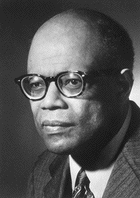 1979
1979Sir W. Arthur Lewis (1915 - 1990)
Premiu Nobel  1979
1979
Economist britanic, nascut in Santa Lucia, Antile,
obtine Premiul Nobel in Economie in 1979, impartit cu Theodore W. Schultz,
pentru investigatiile sale pioniere in dezvoltarea economica indreptandu-si atentie
asupra problemelor tarilor in dezvoltare.
A studiat la St. Mary's College din Santa Lucía si la London School of Economics, unde obtine doctoratul in 1940. A fost profesor la Universitatile din Londra, Manchester, West India, si Princeton. A fost consilier al Comisiei Economice a Natiunilor Unite pentru Asia si Orientul Indepartat si Presedinte al Bancii de Dezvoltare din Caraibe.
Lewis analizeaza tarile in dezvoltare si scoate in relief dualitatea lor: exista doua sectoare economice clar diferentiate, cel rural si cel urban. In sectorul urban, productivitatea muncii este mult mai mare decat la camp. Aceasta permite existenta economisirii si investitiei, ceea ce va duce la cresterea in forma sustinuta a cererii de lucratori. Aceasta cerere poate fi satisfacatoare fara a apare tensiuni salariale deoarece exista o oferta de munca infinit de elastica ce provine din zonele rurale.
Presupunerea bazica a modelului lui Lewis este ca sectorul rural este superpopulat si productivitatea muncii este foarte scazuta. Productivitatea marginala a muncii rurale este practic nula, ceea ce inseamna ca emigratia lucratorilor de la camp la oras nu duce la diminuarea productiei agricole.
Astfel in sectorul urban se produce un "cerc vicios" economie > investitie > locuri de munca ce nu este intrerupt nici de tensiuni salariale si nici din lipsa de lucratori, deoarece cresterea sectorului industrial-urban este garantata pana ce sectorul rural cu productivitate mica este depopulat, ceea ce implica sfarsitul situatiei de subdezvoltare.
Lucrari:
Planificarea economica, 1949. Ed. Fondo de Cultura Económica, Mexic, 1942.
Apasati aici pentru a vedea
cartile puse in vanzare ale lui
W. Arthur LewisTeoria dezvoltarii economice, 1955. Fondo de Cultura Económica, Mexic, 1968.
Labour in the West Indies, 1939.
Economic Problems of Today, 1940.
"The Two-Part Tariff", 1941, Economica
"The Economics of Loyalty", 1942, Economica
"Monopoly and the Law", 1943, Modern Law Review
"Competition in Retailing", 1945, Economica
Monopoly in British Industry, 1945.
"Fixed Costs", 1946, Economica
"The Prospect Before Us", 1948, Manchester School
"Colonial Development", 1949, Transactions of Manchester Statistical Society
"The British Monopolies Act", 1949, Manchester School
"TheEffects of the Overseas Slump on the British Economy", with F.v. Meyer, 1949, Manchester School
"Sur Quelques Tendences Seculaires", 1949, Economie Appliquee
Economic Survey, 1919-39, 1949.
Overhead Costs, 1949.
Principles of Economic Planning, 1949.
"World Production, Prices and Trade, 1870-1960", 1952, Manchester School
"Economic Development with Unlimited Supplies of Labor", 1954, Manchester School
"Thoughts on Land Settlement", 1954, J of Agric Econ
"Trade Drives", 1954, District Bank Review
"Secular Swings in Production and Trade, 1870-1913", with P.J. O'Leary, 1955, Manchester School.
The Theory of Economic Growth, 1955.
"Patterns of Public Revenue and Expenditure", with A. Martin, 1956, Manchester School
"International Competition in Manufactures", 1957, AER
"Unlimited Labor: Further notes", 1958, Manchester School
"Employment Policy in an Underdeveloped Area", 1958, Social and Economic Studies
"The Shifting Fortunes of Agriculture", 1960, in Agriculture and its Terms of Trade
"Depreciation and Obsolescence as Factors in Costing", 1961, in Meij, editor, Depreciation and Replacement Policy
"Education and Economic Development", 1961, Social and Economic Studies
"Education for Scientific Professions in the Poor Countries", 1962, Daedalus
"Industrialization and Social Peace", 1963 in Conference Across a Continent
"Secondary Education and Economic Structure", 1964, Social and Economic Studies
"A Review of Economic Development", 1965, AER
Politics in West Africa, 1965.
"Unemployment in Developing Countries", 1967, World Today
Some Aspects of Economic Development
"Economic Aspects of Quality in Education", 1969, in Beeby, editor, Qualitative Aspects of Educational Planning
Aspects of Tropical Trade, 1883-1965, 1969.
Socialism and Economic Growth, 1971.
The Evolution of Foreign Aid, 1972.
"Reflections on Unlimited Labour", 1972, in diMarco, editor, International Economics and Development
"Objective and Prognostications", 1972, in Ranis, editor, Gap Between Rich and Poor Nations
Development Economics: an outline, 1974.
The University in Less Developed Countries, 1974.
"Development and Distribution", 1976, in Cairncross and Puri, editors, Employment, Income Distribution and Development Strategy
The Less Developed Countries and Stable Exchange Rates, 1978.
The Evolution of the International Economic Order, 1978.
Growth and Fluctuations, 1870-1913, 1978.
"The Dual Economy Revisited", 1979, Manchester School
"The Slowing Down of the Engine of Growth: Nobel Lecture", 1980, AER.
"The Rate of Growth of World Trade, 1830-1973", 1981, in Grassman and Lundberg, editors, World Economic Order